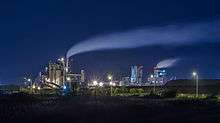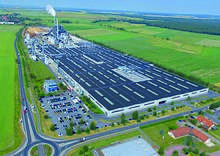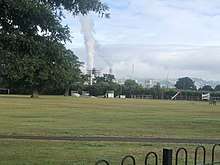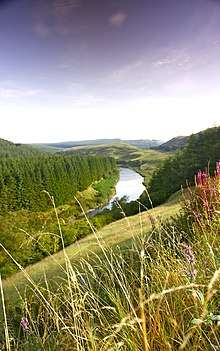Kronospan
Kronospan is an international company that manufactures and distributes wood-based panels which are used in applications including flooring, furniture and timber-framed houses.
 | |
| Private | |
| Industry | Wood, manufacturing |
| Founded | 1897 |
| Headquarters | |
| Products | Processed wood |
| Revenue | €4 billion (2015) |
Number of employees | 14,500 (2017) |
| Website | http://www.kronospan-worldwide.com |
The company manufactures particleboard, medium-density fibreboard, laminate flooring, resins for wood-based panels and oriented strand board. It also produces melamine-faced panels, post-formed worktops, wall panels, lacquered HDF and others and speciality and decorative paper.
History

Kronospan was established in 1897 in Lungötz, Austria, as a family business. Today, Kronospan has developed a supply chain with over 40 production sites and 16 distribution centres in 30 countries, and more than 16,000 workers around the world.
The company’s second factory was opened in 1959 in Salzburg in Austria and its first overseas operation was established in the UK in 1972 in the former coal mining town of Chirk, North Wales. This manufacturing unit is now one of the top 10 manufacturing companies in Wales and employs more than 600 people, with 90% of the workforce living within a 10-mile radius of the site.
In the forty years following the opening of the Chirk unit Kronospan has established operations in 28 further countries, including at Sandebeck in Germany. With the collapse of the Iron Curtain in the late 1980s, Kronospan recognised expansion opportunities within the new markets of Central and South-eastern Europe, opening several units in Poland, Bulgaria, the Czech Republic and the former East Germany. This expansion continued in the early 2000s with new plants in Central Europe in Slovakia, Romania, Croatia and Hungary and than also in Eastern Europe in Ukraine and Russia. In 2000 Kronospan opened its first factories in Asia, and its first outside Europe, at Danyang in China, and in 2005 it established its first unit in America at Oxford, Alabama. More recently, the company has expanded its operations into Southern and Western Europe with new factories in France, Spain and Denmark, as well as acquiring a new plant manufacturing flooring in the US. Since 2015 Kronospan has focused less on opening new factories, preferring to improve the economic and environmental performance of established sites.
In 2011, the company launched the Kronospan Foundation, which supports the core values of the group by focusing on reinvesting resources into local communities and promoting sustainable development.
Locations
Kronospan has operations in 30 countries:

Future Investments
Kronospan is investing $211 million in its enterprises in Belarus during 2017-2018, when approximately 120 new jobs will be created. The director of Kronospan OSB, informed Alexander Lukashenko, Belarus' President, about the company's willingness to work directly with Belarusian state-run timber harvesting enterprises and get the necessary amounts of timber as close to manufacturing sites as possible in order to minimize transportation costs.[1]
The company will also invest EUR 330 million on its production site in Sanem, Luxembourg in the next 5 years. The investment includes a second co-generation unit and extension of the plant's production capacity. The project will make the plant energetically autonomous and minimize environmental impacts.[2]
Production certification
Kronospan's products are certified by the California Air Resources Board (CARB) which applies strict control for air quality and limiting of pollutants, setting the global precedent for eco-friendly manufacturing. The wood-based panel products are also certified by the Program for the Endorsement of Forest Certification schemes (PEFC) and the Forest Stewardship Council (FSC®). The timber used for these products comes from verified and well managed forests, which ensures a renewable and sustainable resource. The FSC® label demonstrates to the public and consumer responsible practices, giving credibility with customers and business partners as well as financial institutions and watchdog organizations. Being FSC® certified shows that Kronospan complies with the highest social and environmental standards on the market. The company handles, uses, stores and destroys chemicals in a safe and environmentally healthy way as well as recycling its waste wood. Kronospan has also been awarded with two internationally recognised environmental standards, which cement those certified as leaders in sustainability. The company’s wood-based panels and associated products had their carbon footprint independently measured and certified by BlueGreen Carbon, and since 2009 can officially supply Carbon Positive chipboard products. Kronospan has also achieved CARB low formaldehyde accreditation, further demonstrating its uncompromising commitment to the environment.[3]
A subsidiary of the company, Kronospan Forestry Ltd., manages over 1000 hectares of sustainable forests in the south-west of Scotland. This includes both young forests as well as mid-age plantations offering greater wildlife diversity. In 1999 the company joined the Forest Stewardship Council scheme, which ensures that sustainable practices are used.[4] Kronospan works with Business in the Community Wales (BICW) which aims to address key social issues in the most deprived rural and urban areas of Wales.[5] In 2003 Kronospan was one of the first organisations to sign up with the Carbon Trust in Wales for a pilot programme to manage carbon emissions.[6][7]
In 2010 Kronospan’s workforce took part in a symbolic two-hour shutdown in protest against Government subsidies paid to the biomass industry, which they say directly threaten their jobs, future wood manufacturing and associated industries.[8][9] Kronospan's shutdown supported the European Panel Federation's[10] Day of Action and the company has joined Green campaigners and the UK’s Wood Panel Industries Federation in lobbying Government through the Make Wood Work [11] campaign to reverse the consequences of the Renewables Obligation, which is a result of European Union Climate Change Directives.[12]
Environmental impact and sustainability
In recent years Kronospan has introduced a broad range of measures to reduce the environmental impact of production and increase sustainability.
Forest ownership
Kronospan achieves higher levels of sustainability through ownership or control of much of the raw materials and logistics required to maintain supply and product quality. This policy is based on the belief that wood is much more than an economically valuable commodity. The company sees conservation as not a luxury but an absolute necessity, and is committed to near-natural, sustainable forest use. For this reason, Kronospan has undertaken to recognize FSC guidelines and to operate sustainable forestry according to these guidelines and principles. In all Kronospan forests the company tries to ensure that wilderness can develop as well and that the natural biodiversity of the areas is given as much opportunity to flourish as possible.

Scotland
Kronospan owns and manages approximately 11,000 ha. of spruce forest in Scotland. About 300 ha. of this is felled each year, then, after a fallow year, is replanted to the UK Forestry Standard and audited by the UK Woodland Assurance Scheme. Plans are in place to increase biodiversity further by creating new wetlands to replace some areas that have been felled.
Germany
In Germany Kronospan owns three forests that were formerly military training areas. They are at Wünsdorf (approximately 4,000 ha.) Jüterbog (approximately 1,500 ha.) and Byhlen (approximately 1,800 ha.).
Production processes
Raw materials
Sustainability is of prime importance in Kronospan’s production processes. When manufacturing wood panels there is a hierarchy of choices for sourcing the necessary wood. The first choice is pre-consumer and post-consumer recycled wood. The second option is sawmill residues. The third choice is round wood timber from the company’s own sustainable forests.
Production facilities
In order to achieve greater sustainability and lower the environmental impact of production Kronospan has embarked on a program of radical modernization in its factories. At Sanem, in Luxembourg, the company has built a factory that uses a new system of drying wood strands at natural low temperature and making maximum use of recycled wood, thus dramatically reducing CVOCs. The rest of the material is used in Kronospan’s biomass cogeneration facilities and fully incorporated into the production process of the factory.
Newly-built combined heat and power plants at the factory site cover Kronospan’s own heating needs and also generate considerable electrical power. As well as covering the company’s own heating and power needs it is also able to supply electricity to the power system of Luxembourg.
The factory at Sanem is a blueprint model for future Kronospan manufacturing sites and several features are already being implemented in the factories at Chirk in the UK and Novovolynsk in Ukraine.
Kronospan Foundation
Kronospan’s aim is to maintain a balanced ecosystem that enriches the surrounding communities’ quality of life. To help achieve this the company created the Kronospan Foundation, which supports and initiates a number of projects promoting environmental sustainability in its local communities.
The foundation works with sponsors and partners to support communities where Kronospan operates specifically with the environment in mind.
Memberships
- FSC (Forest Stewardship Council). Forests for all Forever certificate, held since 2005 for Chirk [13]
- PEFC (Programme for the Endorsement of Forest Certification) [14]
- WPIF (Wood Panel Industries Federation).[15]
- FIRA International (Furniture Industry Research Association) FISP (Furniture Industry Sustainability Programme)
- ISO 14001. ISO 14001 is the international standard that specifies requirements for an effective environmental management system (EMS). It provides a framework that an organization can follow, rather than establishing environmental performance requirements.
Pollution
According to environmental NGO Arnika, Kronospan's production site in the town of Jihlava, Czech Republic, is the No. 2 source of environmental pollution in the country overall, topping the list of released formaldehyde (2018 increase of 3 tons vs. previous year [16]) and just 2nd to Spolana Neratotice in the released amount of mutagenis substances. [17]
In 2019 complaints were filed with the administration of Russian city of Elektrogorsk as environmental scientists found the Kronospan factory was releasing polluted waste water with extreme levels of formaldehyde into a local river and also polluting the air by letting unfiltered production air full of sawdust into the air causing allergies, asthma and respiratory problems in children and adults. On November 19, 2019, the Russian TV-show “Moment of truth” released a YouTube documentary (ru. “Кроношпан уходи”, eng. “Kronospan go away”) with English subtitles on the situation and the environmental catastrophe as well as the suspected corruption going on at the Kronospan plant in Ekektrogorsk.
In January 2002 Kronospan UK was fined £60,000 for discharging effluent into the River Bradley. The company admitted six offences between 29 March–9 October 2001, with a further four offences taken into consideration.[18][19] In May 2005 Kronospan UK was fined £25,000 by Wrexham magistrates after pleading guilty to five offences of polluting local waterways.[20]
In July 2005 Kronospan UK invested £700,000 on an improved water recycling and filtration process.[21][22]
In March 2002, the company was fined £20,500 after 8,000 tonnes of waste timber caught fire at the Chirk plant and burned for several days. The fire was believed to have been caused by spontaneous combustion following a buildup of heat in damp conditions.[23] The plant caught fire again on 17 June 2002 and firefighters were drafted in from stations in North Wales, Cheshire and Shropshire to tackle the oil fire which had started in a boiler room.[24][25] The plant suffered further industrial fires in April and September 2007 and September 2010.[26][27][28] In 2012 firefighters attended industrial blazes at the plant in June, twice in July and again in October.[29][30] On 17 April 2014 fire broke out again at the factory, requiring 5 appliances and an aerial platform ladder. The fire was extinguished 11 hours later.[31]
Worker safety
In January 2003 Kronospan UK was fined £15,000 after admitting failure to ensure the safety of an employee. While removing waste paper from between the rollers of a stopped machine, the employee was caught as the rollers closed and the machine started up. An investigation found that another worker who was attempting to correct a fault on the machine had pressed a button "that, unknown to him or anyone else at the factory, was a delayed start button which set the machine rolling.[32]
References
- "Kronospan plans massive investments in Belarus". Global Wood Market info. 24 May 2017.
- "Kronospan plans massive investments in Belarus". Global Wood Market info. 23 May 2017.
- http://www.kronospan-worldwide.com/environment/fsc-pefc-and-certification/
- Watson, Craig (22 June 1999). "Greenways". The Herald. Glasgow. p. 12. Archived from the original on 14 March 2016. Retrieved 11 January 2016 – via HighBeam Research.
- "Community initiative making major impact". Daily Post. Liverpool. 14 November 2001. p. 2.
- "Move to cut CO2 emissions". Western Mail. Cardiff. 3 December 2003. p. 3. Archived from the original on 16 November 2018. Retrieved 11 January 2016 – via HighBeam Research.
- "Climate concern". Daily Post. Liverpool. 14 January 2004. p. 7. Archived from the original on 15 March 2016. Retrieved 11 January 2016 – via HighBeam Research.
- "Chirk factory workers protest over 'subsidy threat'". BBC Wales Today. North Wales. October 29, 2010.
- "Kronospan workers urge Government to step in over subsidies". Liverpool Daily Post. North Wales. October 30, 2010.
- "European Panel Federation website". Archived from the original on 2010-09-09. Retrieved 2016-01-11.
- Make Wood Work Campaign website
- "Biomass schemes will boost destructive timber imports, claims wood industry". The Guardian. September 11, 2011.
- "FSC Member Portal".
- "Pefc Membership page".
- "WPIF member listing".
- https://znecistovatele.cz/ranks/2018/15/null
- https://znecistovatele.cz/ranks/2018/5/null
- Roberts, Elwyn (9 March 2002). "Fines for pollution of river reduced". Liverpool Daily Post. Liverpool. p. 3.
- "Polluter fined £60,000". Western Mail. Cardiff. 11 January 2002. p. 1. Archived from the original on 10 April 2016. Retrieved 11 January 2016 – via HighBeam Research.
- "Bradley Factory fined". Liverpool Daily Post. Liverpool. 17 May 2005. p. 4. Archived from the original on 10 March 2016. Retrieved 11 January 2016 – via HighBeam Research.
- "Water system on trial". Liverpool Daily Post. Liverpool. 27 July 2005. p. 5. Archived from the original on 10 September 2016. Retrieved 11 January 2016 – via HighBeam Research.
- "Region's firms rack up hefty pollution fines". Liverpool Daily Post. Liverpool. 27 July 2006. p. 4. Archived from the original on 16 March 2016. Retrieved 11 January 2016 – via HighBeam Research.
- "Company fined over blaze". Liverpool Daily Post. Liverpool. 1 March 2002. p. 8. Archived from the original on 11 September 2016. Retrieved 11 January 2016 – via HighBeam Research.
- "Chipboard factory fire". Liverpool Daily Post. Liverpool. 18 June 2002. p. 13. Archived from the original on 10 April 2016. Retrieved 11 January 2016 – via HighBeam Research.
- "70 firemen tackle blaze". Western Mail. Cardiff. 18 June 2002. p. 3. Archived from the original on 10 April 2016. Retrieved 11 January 2016 – via HighBeam Research.
- "Chipboard plant blaze". Liverpool Daily Post. Liverpool. 16 April 2007. p. 8. Archived from the original on 10 April 2016. Retrieved 11 January 2016 – via HighBeam Research.
- "Fire crew puts out factory blaze". Liverpool Daily Post. Liverpool. 17 September 2007. p. 7. Archived from the original on 16 March 2016. Retrieved 11 January 2016 – via HighBeam Research.
- Bagnall, Steve (11 September 2010). "Blaze at chip board factory". Liverpool Daily Post. Liverpool. p. 9. Archived from the original on 10 April 2016. Retrieved 11 January 2016 – via HighBeam Research.
- "Crews at third fire in weeks at Chirk Kronospan factory". BBC News. 8 July 2012. Retrieved 28 March 2013.
- "Kronospan: fire in wood products factory near Chirk". BBC News. 22 October 2012. Retrieved 28 March 2013.
- Williams, Kelly (18 April 2014). "Kronospan Chirk: Firefighters spend 11 hours tackling factory blaze". North Wales Daily Post. Llandudno Junction. Retrieved 11 January 2016.
- Hall, John (24 January 2003). "Firm fined £15,000 after worker's arm got stuck in machine". Liverpool Daily Post. Liverpool. p. 18. Archived from the original on 1 December 2017. Retrieved 11 January 2016 – via HighBeam Research.